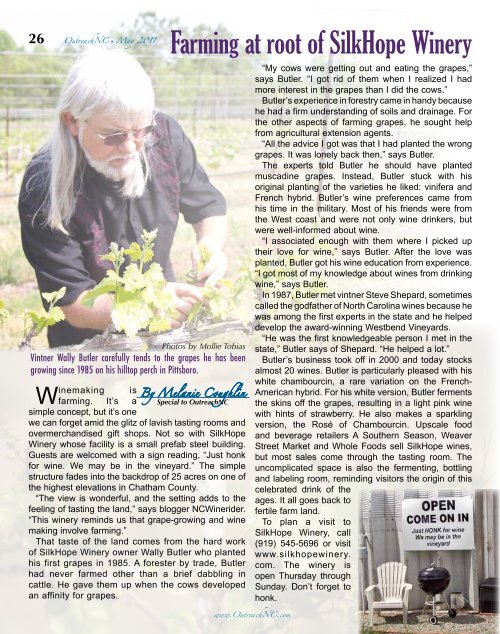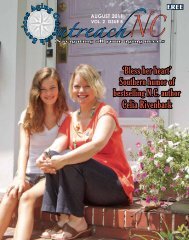May 2011 - OutreachNC Magazine
May 2011 - OutreachNC Magazine
May 2011 - OutreachNC Magazine
Create successful ePaper yourself
Turn your PDF publications into a flip-book with our unique Google optimized e-Paper software.
26 <strong>OutreachNC</strong> • <strong>May</strong> <strong>2011</strong><br />
26 <strong>OutreachNC</strong> • <strong>May</strong> <strong>2011</strong><br />
Farming<br />
Photos by Mollie Tobias<br />
Vintner Wally Butler carefully tends to the grapes he has been<br />
growing since 1985 on his hilltop perch in Pittsboro.<br />
Winemaking<br />
is By Melanie Coughlin<br />
farming. It’s a Special to <strong>OutreachNC</strong><br />
simple concept, but it’s one<br />
we can forget amid the glitz of lavish tasting rooms and<br />
overmerchandised gift shops. Not so with SilkHope<br />
Winery whose facility is a small prefab steel building.<br />
Guests are welcomed with a sign reading, “Just honk<br />
for wine. We may be in the vineyard.” The simple<br />
structure fades into the backdrop of 25 acres on one of<br />
the highest elevations in Chatham County.<br />
“The view is wonderful, and the setting adds to the<br />
feeling of tasting the land,” says blogger NCWinerider.<br />
“This winery reminds us that grape-growing and wine<br />
making involve farming.”<br />
That taste of the land comes from the hard work<br />
of SilkHope Winery owner Wally Butler who planted<br />
his first grapes in 1985. A forester by trade, Butler<br />
had never farmed other than a brief dabbling in<br />
cattle. He gave them up when the cows developed<br />
an affinity for grapes.<br />
at root of SilkHope Winery<br />
www.<strong>OutreachNC</strong>.com<br />
“My cows were getting out and eating the grapes,”<br />
says Butler. “I got rid of them when I realized I had<br />
more interest in the grapes than I did the cows.”<br />
Butler’s experience in forestry came in handy because<br />
he had a firm understanding of soils and drainage. For<br />
the other aspects of farming grapes, he sought help<br />
from agricultural extension agents.<br />
“All the advice I got was that I had planted the wrong<br />
grapes. It was lonely back then,” says Butler.<br />
The experts told Butler he should have planted<br />
muscadine grapes. Instead, Butler stuck with his<br />
original planting of the varieties he liked: vinifera and<br />
French hybrid. Butler’s wine preferences came from<br />
his time in the military. Most of his friends were from<br />
the West coast and were not only wine drinkers, but<br />
were well-informed about wine.<br />
“I associated enough with them where I picked up<br />
their love for wine,” says Butler. After the love was<br />
planted, Butler got his wine education from experience.<br />
“I got most of my knowledge about wines from drinking<br />
wine,” says Butler.<br />
In 1987, Butler met vintner Steve Shepard, sometimes<br />
called the godfather of North Carolina wines because he<br />
was among the first experts in the state and he helped<br />
develop the award-winning Westbend Vineyards.<br />
“He was the first knowledgeable person I met in the<br />
state,” Butler says of Shepard. “He helped a lot.”<br />
Butler’s business took off in 2000 and today stocks<br />
almost 20 wines. Butler is particularly pleased with his<br />
white chambourcin, a rare variation on the French-<br />
American hybrid. For his white version, Butler ferments<br />
the skins off the grapes, resulting in a light pink wine<br />
with hints of strawberry. He also makes a sparkling<br />
version, the Rosé of Chambourcin. Upscale food<br />
and beverage retailers A Southern Season, Weaver<br />
Street Market and Whole Foods sell SilkHope wines,<br />
but most sales come through the tasting room. The<br />
uncomplicated space is also the fermenting, bottling<br />
and labeling room, reminding visitors the origin of this<br />
celebrated drink of the<br />
ages. It all goes back to<br />
fertile farm land.<br />
To plan a visit to<br />
SilkHope Winery, call<br />
(919) 545-5696 or visit<br />
www.silkhopewinery.<br />
com. The winery is<br />
open Thursday through<br />
Sunday. Don’t forget to<br />
honk.





